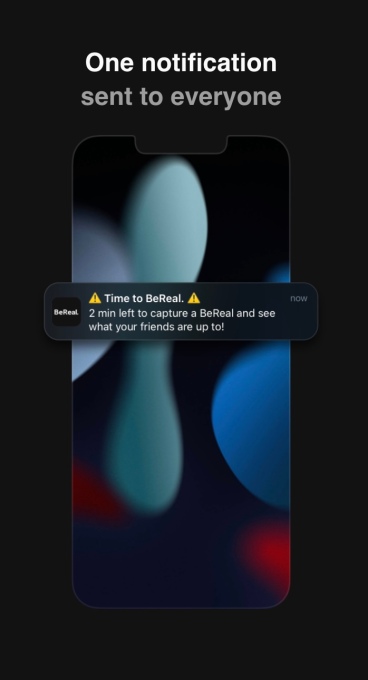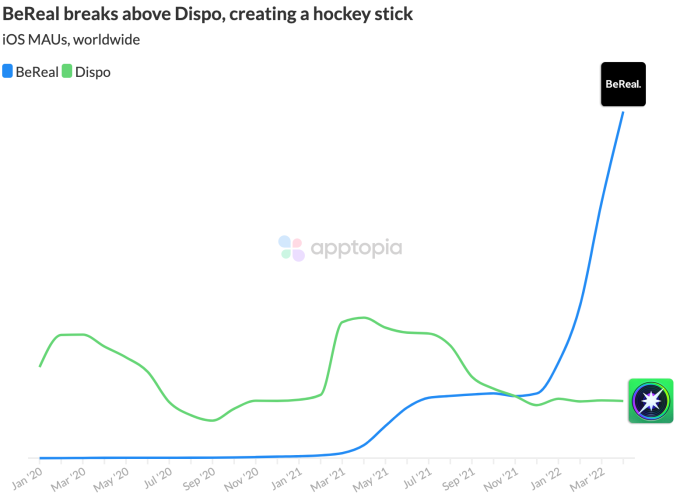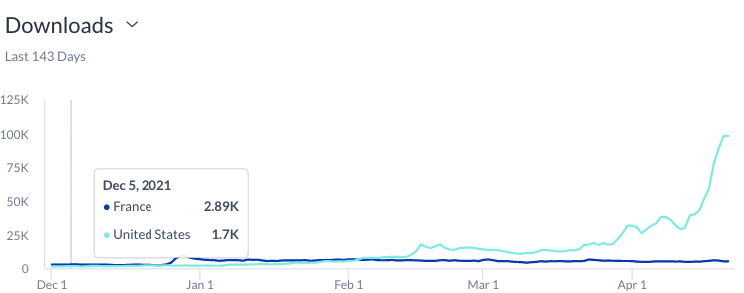An app called BeReal, founded by former GoPro employee Alexis Barreyat along with Kévin Perreau, launched in December 2019 with its idea of asking users to post an unedited photo once per day after receiving a push notification. Upon receiving the alert, the user has up to 2 minutes to share what they’re up to and can see the photos their friends also posted.
The app is simple to use, capturing a selfie and front-facing photo simultaneously — an experience that recalls our fond memories of the long-lost photo app Frontback. (RIP).
The company explains this experience offers users a chance to show off who they really are.
The concept itself is not entirely novel. Besides Frontback’s use of dual cameras, a similar idea involving push notifications emerged amid a wave of apps trying to siphon users away from Instagram a few years ago.

Image Credits: BeReal
An app called Minutiae, launched in 2017, helped pioneer the same concept BeReal is now capitalizing upon: alerts that instruct users to snap whatever it is they’re doing now. Minutiae co-founder Martin Adolfsson recently lamented to TechCrunch that BeReal “borrowed pretty heavily” from his idea while touting its authenticity, much to his distress.
Unfortunately, though, ideas aren’t patents. And we’ve seen many apps and products over the years offering similar social experiences where only one actually becomes the breakout success for its time. Look at Qik vs. Ustream.tv; Gowalla vs. Foursquare; Phhhoto vs. Boomerang; We Heart It vs. Pinterest; or, more recently, TikTok vs. everyone else trying to clone it.
Plus, while Minutiae would allow users to browse strangers’ photos from around the world BeReal more squarely aims itself at groups of real-life friends.
There is some demand for new photo-sharing apps among younger users who are getting fed up with Instagram’s constant changes, its cramming in of new features like Reels and Shopping, and its overly-polished creator content. Other apps, like Minutiae and BeReal, have also experimented with unique photo-sharing experiences in an attempt to lure users away from Instagram with varying degrees of success.
Poparazzi — an app that turned Instagram’s tagging feature into its entire premise — hyped itself to the top of the App Store using a series of growth hacks not too long ago. It has since seen its popularity fade and is now No. 87 in the Photo & Video category on the U.S. App Store.
Another app, Dispo, delayed the release of your digital snaps to give itself a nostalgic feel, but aimed itself at a generation that has never known what it’s like to wait for prints. It also didn’t become the next new Instagram and is now No. 143 in Photo & Video on the App Store.

Image Credits: Apptopia
BeReal, meanwhile, has been around for a couple of years. But app intelligence firm Apptopia noted earlier this month that 65% of its lifetime downloads occurred in 2022 and its monthly active users had grown 315% year-to-date. Today, the firm offered TechCrunch updated figures. It found that BeReal has seen 7.67 million downloads year-to-date, representing 74.5% of its lifetime installs. France (where the app is based) and the U.S. lead, with a 20.5% and 19.7% share of installs, respectively.
The firm attributes the growth to a combination of word-of-mouth, BeReal’s college ambassador program and newer features like WidgetMoji and RealMoji — the former which puts your friends into a Home Screen widget, and the latter which lets you react with stickers in iMessage conversations. However, this level of rapid growth typically implies marketing or ad spend, not just organic adoption, which would be a slower rise and less sharp of a jump.

Image Credits: Apptopia
BeReal would have the funds. The a16z and Accel-backed app raised $30 million in a Series A last year. It sure seems like it’s put some of that money to use.
And as it turns out, at least some of BeReal’s growth had been manufactured to make the app look as if it were a viral hit. College students at Brown’s student paper reported BeReal was paying them $30 per referral and $50 for an app download with a review. The students would receive the money via PayPal or Venmo, they said. Other student ambassadors organized events and doled out perks, like free boba, to recruit new users, said a report from Rice University’s student paper.
The current ambassador program is running from January through June 2022, per BeReal’s website. (BeReal declined to talk to TechCrunch, saying they “are not ready for medias [sic].”)
There is nothing really wrong with paid user acquisition — this is how the app ecosystem works, after all. Besides, some paid users become engaged and loyal. That’s the goal!
BeReal is so far finding success with this model: Apptopia says daily active users have reached 2.93 million as of the time of writing.
It also has a 4.8 rating across nearly 22,000 user reviews on the App Store and a 4.5 rating across nearly 15,000 reviews on Google Play. It’s the No. 4 Overall app in the U.S. App Store right now.
That said, it’s a bit frustrating to see apps engaged in buying installs and five-star reviews get written up so definitively as Gen Z’s new favorite toy, in articles describing the app’s growth as organic. There may very well be some word-of-mouth interest here, but that interest has been combined with good ol’ paid app installs.
In the early days of the App Store, there were more direct channels for this sort of cash-to-downloads funnel, until Apple cracked down on companies “buying” their growth. But that only led to more behind-the-scenes paid user acquisition efforts. Today, in addition to traditional channels — like online ads/social ads, billboards, TV, etc. — we see things like “viral” TikToks that were actually undisclosed influencer marketing deals. Or, as with BeReal, college ambassadors getting compensated to hype an app to a target demographic.
The latter may actually work if the hype puts the app in front of users who end up charmed by the experience and stay with it.
BeReal likely has a good bit of user acquisition fuel ahead of it. And since its gimmick involves turning on push notifications, it could retain loyal users over time. But it has a long way to go to prove that it can become a part of users’ everyday rotation — something that we won’t know until the paid acquisition efforts slow and the app is left to fend for itself in the competitive landscape.
Still, we gotta love BeReal’s download URL: it’s bere.al/downloadthedamnthing.
Okay, why not!

